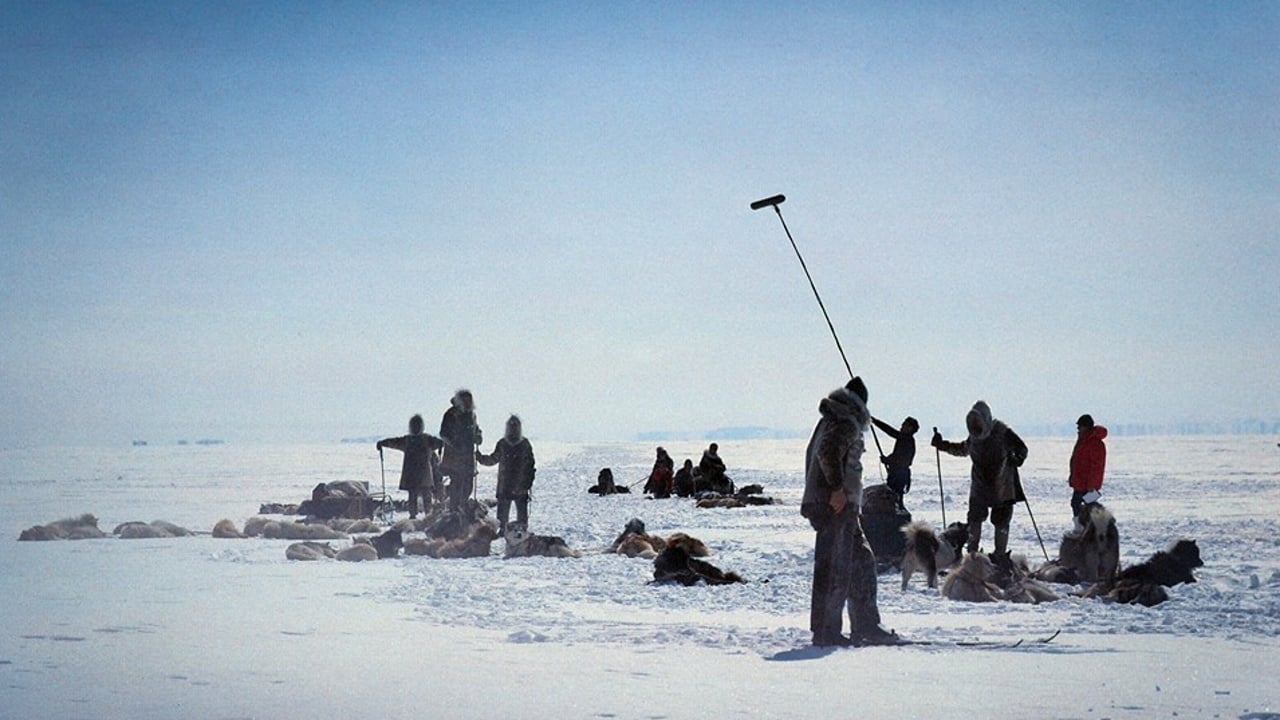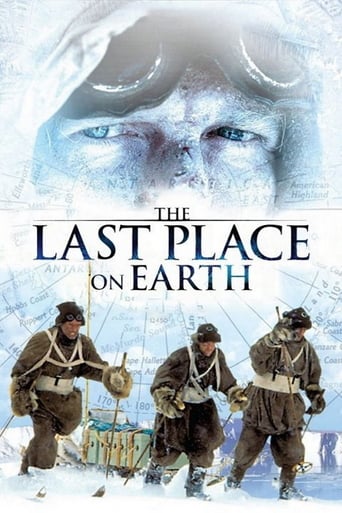Freaktana
A Major Disappointment
Glucedee
It's hard to see any effort in the film. There's no comedy to speak of, no real drama and, worst of all.
DipitySkillful
an ambitious but ultimately ineffective debut endeavor.
Freeman
This film is so real. It treats its characters with so much care and sensitivity.
canuckteach
This is a fabulous mini-series - a docudrama - about the South Pole expeditions of Norwegian R Amundsen and the British Robert Falcon Scott. The acting and photography are superb, an excellent period piece (although the quality of the DVD itself is a bit grainy).Unless you've slept under a rock for 100 years, or never read a history book, you know that Amundsen reached the Pole first, and successfully returned, whereas Scott and 4 of his men perished miserably on the return trip. Why? It's all about project management. This DVD is all about properly managing a complicated project dealing with the wilds of nature. Amundsen has 'it' - Scott doesn't.The Norwegians are highly-skilled at traveling in frozen wastelands. They are in fine physical condition, they know how to ski and handle dog-teams. Amundsen recruits a small team of specialists. He doesn't get too high or low about anything, nor does he get too close to the team--he remains aloof. He makes meticulous preparations.The British are operated like a Navy Ship under military command: Scott gives orders and doesn't want them questioned. He has a group of favorites, but takes a colossal team of guys, mostly military, but some civilians, who find Scott pompous, arrogant and misguided. He breaks promises and plays the men against each other, while they hope to be in the final group to make the final trek. He sends the wrong guy to purchase Siberian ponies, to save a few bucks, plus he fails to include a couple of key players, including a properly-trained team to tend to the motor sledges. Since there wasn't a Walmart Auto (or Canadian Tire) in the Antarctic, you might wonder what he was thinking. But his biggest problem is the notion of man-hauling the enormous loads all the way to the Pole. you see: no one walks when they can ride. and the Eskimos always rode dog-teams. Scott had experienced some difficulties with dogs in the past, but that's no excuse.I might direct your attention to a couple of fabulous scenes featuring Bill Nighy, who plays Meares, one of the dog-team drivers. Meares says he'd rather swim back to New Zealand than spend another season under Scott's command. He later tells Scott, in so many words, that he finds it highly unlikely that Scott will live to criticize Meares' choices. Nighy is terrific.In case you missed it, this screenplay is based on a historical non-fiction piece created after it was discovered that many unflattering portions of Scott's diary were excised from the publication released to the public. There has been quite the resistance from many quarters to a revised viewpoint of a man considered to be a great British hero. Apparently, some recent discovery that the weather was particularly cold when Scott tried to return from the Pole is cited as startling scientific evidence that this presentation of Scott as a peevish incompetent should be set aside. well, whose decision was it to try walking there and back anyway? As Meares says (in this dramatization): 'any man who sits in the Antarctic and whines about the weather is unfit to lead'.I'll close with a quote, not from this film, but from the 1948 'Scott of the Antarctic' with John Mills. The Scott character (Mills) tells Nansen (the elder statesman of Arctic exploration) that he is going to the South Pole with motor sledges, Siberian ponies, and dogs. Nansen replies that Scott should take dogs, dogs and more dogs.Amundsen did - Scott didn't. Case closed.Enjoy this excellent re-creation of events. It's insightful.
widescreenguy
and teamwork and always politics.Scott is the typical stiff upper lip brit, soldiering on in the face of adversity. The problem is the adversity comes out of the British sense of entitlement and superiority. Time and again they refuse to face the fact they don't run everything and circumstance and chance is just going to tremble in the presence of royalty wot. hip hip fap.So Amundson has to pull a fast one to get to the Antarctic, and his approach is to make hard decisions and difficult choices, like knowing full well ahead of time the sled dogs at some point are going to be a source of food for them and the remaining dogs.When Scott feeds the exhausted horses (which shouldn't have been there in the first place) to the men and dogs, it's viewed in far more politically correct and image palatable manner. jolly good, well on with it then. the reason the courage and determination was necessary from the British expedition is because Scott refused to accept experience based input from his subordinates. before and during the expedition.When things go wrong, he chalks it up to bad luck or the weather or the failure of others. Amundson doesn't even have to do that because his decisions avoided the impossible situations in the first place.watch the dramatization and decide for yourself.
steeled123
They all die at the end! Anyway the source book for this mini-series is still one of the most controversial polar books ever written and this version pulls no punches.From start to finish it takes a rather anti-Scott view but in light of the "evidence" presented here it's not really surprising as this is myth stripping at it's finest. Gone is the famous last line of Oates, which I always considered a fabrication anyway, and also rather surprisingly cut is the reaction of Scott to the South Pole.The Uk cast are without exception wonderful with such wonderful character actors as Richard Wilson, Hugh Grant and Tom Georgeson getting very little screen time.See this and then go and seek out John Mills.
Rosabel
This series was a great revelation to me: I'd heard of "Scott of the Antarctic" but never of Roald Amundsen, the man who beat Scott to the South Pole. It is a fine adaptation of the book by Roland Huntford, and does a great job of poking a hole in the romantic illusion that this adventure was some landmark episode of English heroism. It is instead an illustration of a truth that no one at the time could admit: that by 1912 "Britain was forgetting how to think", and too long a period at the top as the world's pre-eminent power had bred arrogance, inflexibility and an inability to learn. The contrast between the pompous incompetence of the British and the intelligence and adaptability of the underdog Norwegians is highlighted throughout the series. As Amundsen says in the first episode, "Experience teaches them only one thing: that they are British, and therefore pre-eminent. But Nature is deaf to such things; she cannot hear the tunes of glory." Even to a person who does not already know the historical outcome of this story, the British from the beginning seem to be marching to their doom. The whole expedition, despite the money and materiel lavished upon it, is a story of shoddiness, second-rate decision-making, and slovenly improvisation. The blame for most of this is laid squarely upon Scott himself, who is shown as a thoroughly mediocre leader. Martin Shaw gives a wonderful performance as Scott, and even manages the considerable feat of creating some sympathy for this stupid man, pushed out of his depth and driven by ambition to attempt something he is incapable of achieving. There was some outrage, especially in Britain, both at the book and the series, which were seen as unfairly kicking Scott, who had at least paid with his life for any mistakes he might have made. The makers of this series are to be complimented for not yielding to such sentimentality. They never let us forget that 4 other men died with Scott as a result of his stupidity, and the horror of their slow death by starvation, scurvy, exposure and infection is presented unflinchingly. The end of the series gives us a cynical scene with Scott's widow and the responsible officers of the Admiralty busy concocting the myth of "Scott of the Antarctic" which was to beguile the public until Huntford's book came along to shine the light of truth into this corner of history. Hopefully, as a result of the book and the series, there can be no going back to the comfortable lies of the past.

